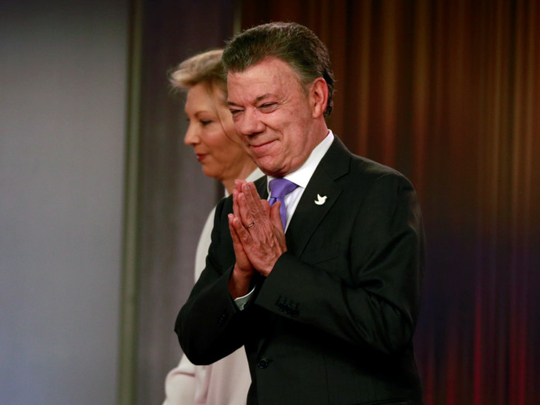
“Juan Manuel Santos won the Nobel peace prize even though the Colombian people rejected the peace deal he had brokered with the Farc guerillas,” said the Guardian in an editorial, and went on to examine the merits of the prize itself.
“This paper had argued that the prize be given to the heroic volunteers of the Syrian White Helmets, who showed still more of their nobility of spirit by congratulating Mr Santos... The Nobel peace prize teeters every year between two dangers: giving the award to some who can make peace only because they have stopped, or at least paused, the wars they waged for years — Henry Kissinger would be the best example — and giving it to people whose sentiments are irreproachable but whose record of action is thin. [US] President [Barack] Obama deserved the thanks of the whole world for not being George W. Bush in 2009, but not really the Nobel peace prize,” the paper observed.
The New York Times echoed similar sentiments in its editorial. “The history of second-guessing the Nobel Peace Prize is a rich one... So is not surprising that the decision to give this year’s prize to President Juan Manuel Santos of Colombia — for a peace agreement that his countrymen rejected five days before the prize was announced — should raise global eyebrows. Yet it is that very history of controversy and debate raised by the Peace Prize that makes this year’s award well deserved,” the paper said.Defending the decision despite the Colombian peace process appearing to falter, the Times said: “The referendum, the committee noted, was against specific elements of the peace agreement, and not against peace. However imperfect, and however unsatisfactory to the many victims of the 52-year insurgency, the agreement was an extraordinary achievement for both sides, and especially for Mr Santos...” Whether the Peace Prize can help breathe life into the peace efforts remains to be seen. But there is no question that Alfred Nobel’s bequest has been wisely applied.”
The Wall Street Journal, however, was deeply disappointed with the choice. “Not everyone who wins a Nobel Peace Prize is undeserving. Lech Walesa, Andrei Sakharov, Aung San Suu Kyi and Liu Xiaobo won for demanding human rights and democracy from despotic regimes... But these are exceptions to a rule in which the prize goes to the champions of false peace and naive good intentions. Such was the case Friday when the Norwegian Nobel Committee bestowed the honour on Colombian President Juan Manuel Santos, lately in the news for failing to persuade voters to endorse his peace deal with the Revolutionary Armed Forces of Colombia guerrillas.”
Admitting that Santos “spent five years trying to negotiate a peace deal with the Farc,” the paper said: “Colombians thought otherwise, and with good reason. After being terrorised by the Farc for 50 years, they were not inclined to accept a deal that would have given Farc leaders near-impunity, guaranteed them seats in Congress, or allowed them to amplify their propaganda in the media.”
The Asahi Shimbun in Japan was more optimistic and hoped the prize would be a catalyst for peace in the country.
“The decision to award this year’s Nobel Peace Prize to Colombia’s leader should breathe new, vigorous life into the faltering peace process to end the long-running civil war in the country. Building peace in a country that has been mired in a gruesome war for so long inevitably requires an immense amount of time and effort. Awarding the Nobel to Santos should make the international community pay more serious attention to the situation in Colombia and provide more support to the peace efforts” The committee’s choice reflects its solid principle that the Nobel Peace Prize should be given not only to people who have helped build peace but also to people making commendable efforts to realise peace,” the paper said.




_resources1_16a31069e4e_small.jpg)






